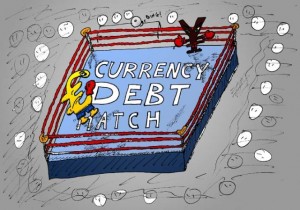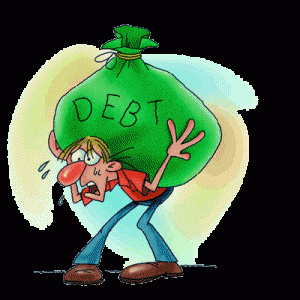October 30, 2012
 Look around, what do you see? I see a lot of people struggling with their finances. Did you know the fact that an average family’s income is lower than it was a decade ago? How is that to you? Doesn’t it seem at least a little unfair? It surely does to me. Unfortunately none of us have heard that prices got also lower. So how do people manage to survive these days? Most of them are really bad at money management. And you are absolutely right, it leads them to having a debt. Some even have up 10 debts same time. Is there anything possible to do with your debt? Go on reading and you may find some good solutions for you:
Look around, what do you see? I see a lot of people struggling with their finances. Did you know the fact that an average family’s income is lower than it was a decade ago? How is that to you? Doesn’t it seem at least a little unfair? It surely does to me. Unfortunately none of us have heard that prices got also lower. So how do people manage to survive these days? Most of them are really bad at money management. And you are absolutely right, it leads them to having a debt. Some even have up 10 debts same time. Is there anything possible to do with your debt? Go on reading and you may find some good solutions for you:
1. First of all, try to keep a track of your debts. Put everything on list to have a better visibility on what you are at right now.
2. Be realistic about your monthly budget. Always know how much you can afford to spend during next 30 days. This will help you to have a better understanding of your everyday expenses.
3. Your credit payments. Do not stick with minimum. I know that they say that it is better to make small payments then not making it all. This is true of course. But your goal is to forget your debt as a nightmare, that is why consider making even more cuts in your budget in order to increase your payments.
4. Limit yourself in spending. Pay with cash. You cannot pay with cash= You cannot buy this thing.
5. Have only 1 credit card. In case you have more, lock them somewhere or at least use the one that has the lowest interest rate.
6. Work on emergency funds. Learn to prioritize emergency cases.
7. This is the part where you will have to say good bye to your outdoors activities for a while. Eat in, invite your friends to watch movies at home, spend more time with your family. Do not imprison yourself, just try to be more rational with your entertainment. Do not turn to fast cash online only because all of your close friends are going to some interesting trip and you also feel like can’t miss this event. It’s not worth it.
8. Never give up saving. No matter how hard it is, keep on saving. Set a goal, have a rough plan and do not stop.
There are plenty of ways to help you either to avoid having a debt or maybe guide you through difficult financial times. It can get really tough sometimes; just remember that no one but you can help yourself. Be wise with your money and believe me, life will reward you!
Tags:
budgeting,
cash,
Debt Consolidation,
Debts,
economy,
financial planning,
money,
personal finance,
Problems
October 25, 2012
 There are many costly expenditures that are unfortunately a necessary evil, but there are always ways to ensure you can save at least a little bit of money on items such as furniture and electronics, as well as your heating and water bills.
There are many costly expenditures that are unfortunately a necessary evil, but there are always ways to ensure you can save at least a little bit of money on items such as furniture and electronics, as well as your heating and water bills.
One of those, furniture, is a cost that always crops up from time to time. With several rooms in any home and the need to furnish pretty much all of them, there is a good chance that buying furniture is an annual grind on your finances.
There are, however, several ways in which you can save money when purchasing items of furniture for the home.
Buy quality products
When purchasing furniture for the home, you will usually want it to stand up to the test of time and the only way of achieving that is to purchase quality furniture such as solid oak. The better the quality, the longer it will last and the better it will look in your home.
Quality solid wood furniture does of course tend to cost more than your typical “wood effect” items, but in the long-term, it will pay off as it will last longer and therefore remove the need to keep on buying new pieces of furniture because they’ve worn out quickly.
For those pieces of furniture that tend to get tucked away from sight and only come out occasionally, they’re the ones that you don’t have to worry about emptying your wallet on.
Getting your DIY on
Some people have a healthy dose of experience in fixing things and tend to be a bit handy in woodwork or similar. If you’re one of these, then you have the ability of saving money on your furniture by mending those items that are looking a little worn out.
Given the right equipment, refinishing wooden furniture is very possible and doesn’t have to take that long either. This is a great way of sprucing up furniture that looks a bit tattered, but could easily be brought up to scratch with a fresh layer of stain or paint, maybe the upholstered sofa requires a bit of stitching. It really is a great alternative to buying new furniture when it can be repaired all the same.
Keep your eyes peeled and be patient
It is very likely that you’re struggling to find that perfect solid oak table for the right price after looking for what feels like forever. The trick is to be patient and just keep your eyes open for new deals and sales.
Christmas and New Year will often be perfect times to find the right kind of deal you’re after, therefore it can really pay off waiting a few weeks or months until that time and grab yourself a brilliant deal.
Tags:
budgeting,
Cash Flow,
economy,
financial planning,
Home Improvement,
Lifestyle,
Monay,
savings
October 21, 2012
 With the average household debt increasing constantly all over the UK, homeowners everywhere are struggling to keep their increasing monthly payments under control. Without the proper debt management solution, their attempts are frequently accompanied by failure and most of the times lead to a growth of their monthly payment that simply cannot fit in their budget.
With the average household debt increasing constantly all over the UK, homeowners everywhere are struggling to keep their increasing monthly payments under control. Without the proper debt management solution, their attempts are frequently accompanied by failure and most of the times lead to a growth of their monthly payment that simply cannot fit in their budget.
The various credit card related debt as well as the other large payments like mortgages, education or automobile loans are getting out of hand, an aspect which reflects in the rising number of people filing for bankruptcy. However, an alternative road to financial security and freedom comprises of corroborating your credit card debt with a secured loan. Let’s find out why.
1. The overall monthly interest paid is reduced
The principal issue and the main generator of credit card debt is the high interest rate in association with the additional charges. In essence, unsecured loans have an innate high interest rate that guarantees your lender he will be able to recuperate at least a part of his investment if you are not able to pay your debt. On the other hand, homeowner loans are secured against equity, which means that the risk you pose for the creditor is lower. Therefore, the interest rates of the loan are substantially reduced.
2. Your income/spending budget can be calculated easier
When you have a plethora of credit cards that have to be paid on different dates and each of them requires minimum monthly payments, your debt can easily spiral out of control. It’s hard enough to stay up to date with the major loans, so adding credit cards into the equation complicates things immensely. However, since a single affordable payment can be easily integrated within your budget easier and it eliminates effectively the need to remember every other single debt you have, you are greatly simplifying your finances.
3. A single creditor to deal with
The more unpaid credit cards you own, the more calls you will receive from the lenders and banks. As your debt grows – and, without the proper solution, it will – you will start to receive more and more calls from the creditors, often at the most inappropriate moments. However, since the secured loan consolidates all debts into a single account and the lender takes charge of handling your finances, you can be certain that your other creditors will no longer trouble you.
4. Enhanced affordability for the monthly payments
Secured loan consolidation doesn’t only imply that the value of the interest is lower. In fact, you can also specify a longer repayment period, which permits you to minimize the monthly payments to a sum that you feel comfortable with. True, the total interest paid is directly proportional to the span of the repayment period, but you will be able to manage your household budget easier.
5. You won’t be tempted to spend more than you should
What every credit card actually represents is a lure for overspending. In other words, how great is it to purchase something you want – not necessarily need – now and pay for it later? Cutting up your credit cards and consolidating the debt with the secured homeowner loan is just the cure you need for that temptation!
Tags:
budgeting,
Credit Card Debts,
Credit Cards,
debt,
financial planning,
home loans,
investments,
L:oans,
money,
personal finance
September 19, 2012
 Signs of a Shopping Addiction
Signs of a Shopping Addiction
Like any other addiction, it can be difficult to recognize when you’ve truly crossed the line into the dangerous territory of “shopaholic.” It’s one thing to recreationally shop at the mall on a Friday night and do a bit of end-of-week splurging, and another to make it a weekly – or worse, daily – habit. This habit, as has been seen in financially devastated households across the country, can culminate to cripple not just your budget, but your entire family’s budget.
Below are five tell-tale signs you may belong to the 6 percent of Americans who have developed addiction to shopping:
- Impulse shopping. Perhaps the most common sign of being a shopping addict is the tendency to purchase items you didn’t intend to buy, instead acting on a general whim. When the sales clerk approaches you and tries to sell you a product, are you more likely to say “no thanks” and walk away, or find a justification to buy the item against your better judgment? You may notice that you especially have this tendency with a particular group of products you’ve taken a liking to – clothing, electronics, etc.
- The “rush.”The next time you find yourself out and about at a shopping center, stop to consider why you’re there to begin with. Have you set out on an agenda to meet a specific need, or are you wandering about in search of something to do – the “rush” of purchasing a product? Shopping is attributed with increases in dopamine levels of the brain upon buying a product, providing a science to what some may incorrectly see as a fickle disease. This dopamine rush can, more often than not, form a real addiction that makes you crave a new purchase much like you would a cigarette.
- Stress shopping. Shopping addiction forms when other aspects of life begin to go awry. If you find that you shop the most when your stress levels are high or you flee to the mall post-argument, re-evaluate your shopping habits. You may be particularly prone to this habit if you already suffer from other disorders such as depression, anorexia, or bi-polar disorder.
- Your closet is already filled with tagged items. Perhaps the most obvious looking-glass sign that a person suffers from a shopping addiction is the stockpiling of unused items. If your closet is loaded with clothing items that have had their tags attached to them for a long period of time and have begun gathering dust, it’s an obvious sign that a person’s shopping habits are beyond irregular and need attention called to them.
- Anxiety. Though not the easiest feeling to pinpoint with the million other stressors in your life, it is likely that your anxiety is a result of shopping (or a lack thereof) if you feel it most overwhelmingly during the days you haven’t gone shopping. Consider it a withdrawal that can drastically alter your mood and ability to concentrate.
This addiction, referred to by psychologists as Compulsive Buying Disorder, can lead to a frenzy of financial distress, as you find yourself signing up for credit cards you can’t afford (especially retailer-specific cards) and re-allocating funds meant for essentials so you can purchase that “must-have” cardigan carefully placed in the shop window for your eager eyes to ogle. To help prevent your addiction from moving any farther along its trajectory, consider taking small steps to changing your habits: carry a set amount of cash everywhere you go, change daily routes to avoid stores, exercise, and more. The proactive steps just may save you a bundle in the long run.
Garfield Refining is a Philadelphia based precious metal refinery offering nation-wide service. This 120 year old refinery buys and refines gold, silver, platinum, and palladium and services both B2B and B2C markets. For live gold prices check out @GarfieldGold on twitter.
Tags:
budgeting,
financial planning,
money
September 12, 2012
 In the week before pay day, many people start praying for their next cheque to clear, as finances start to get dangerously low. Living from one pay cheque to the next can be dangerous, and before you know it, you’ve borrowed yourself into debt. 61% of people admit that they live from pay cheque to pay cheque. So how can you avoid this trend?
In the week before pay day, many people start praying for their next cheque to clear, as finances start to get dangerously low. Living from one pay cheque to the next can be dangerous, and before you know it, you’ve borrowed yourself into debt. 61% of people admit that they live from pay cheque to pay cheque. So how can you avoid this trend?
Budgeting
With a budget, you’ll have a clearer idea of how much disposable income you have, and this will hopefully stop you from overspending. It may become clear that you are living above your means and that it is time for you to cut down on expenditures; particularly luxuries.
Be a Tracker
Tracking your spending means you have a better idea of where your money is going. Save your receipts and organise them into categories so they are easy to manage. Tallying up the total will give you an overview of total spending. Using Excel can help you analyse the data and make decisions on where you need to cut down.
Maximise Your Income
If you can get a raise, flutter your eyelashes at your boss, but a higher salary isn’t the only way to increase your income. Consider working part-time on a Saturday or turn your hobby into a cash cow. However, making more money doesn’t necessarily mean you will cure your tendency to spend all of it before pay day. 30% of workers earning six figure salaries also admit to living from pay cheque to pay cheque.
A Financial Paradigm Shift
If you are in this overspending position, it’s likely that you aren’t the most responsible person with your money. You may spend more than you really make by overestimating your income. You may just have few organisational skills when it comes to money and you have no idea where it is all going. In this case, hopefully your budget will do all the hard work and get you back into a good financial position.
Set yourself goals and visualise yourself as master of your bank account – the days of borrowing from family and banks are over. Keep that in mind and stick to your budget, rewarding yourself every now and then with a treat. Try to focus on only spending what you need to for 99% of the time: bills, rent, and travel to work.
Uncertainty
In an uncertain climate, who knows when you will need disposable money to prop you up? You may lose your job or get into an accident. In these situations it always helps to have an emergency savings fund, but how are you going to protect yourself if you can’t even make it to pay day, let alone put money aside? Guard yourself and your loved ones through responsible financial practices and cut down on all the luxuries which are putting you further into debt. It’s time to stop worrying.
Tags:
budgeting,
Cash Flow,
financial planning,
money,
personal finance,
savings
 Look around, what do you see? I see a lot of people struggling with their finances. Did you know the fact that an average family’s income is lower than it was a decade ago? How is that to you? Doesn’t it seem at least a little unfair? It surely does to me. Unfortunately none of us have heard that prices got also lower. So how do people manage to survive these days? Most of them are really bad at money management. And you are absolutely right, it leads them to having a debt. Some even have up 10 debts same time. Is there anything possible to do with your debt? Go on reading and you may find some good solutions for you:
Look around, what do you see? I see a lot of people struggling with their finances. Did you know the fact that an average family’s income is lower than it was a decade ago? How is that to you? Doesn’t it seem at least a little unfair? It surely does to me. Unfortunately none of us have heard that prices got also lower. So how do people manage to survive these days? Most of them are really bad at money management. And you are absolutely right, it leads them to having a debt. Some even have up 10 debts same time. Is there anything possible to do with your debt? Go on reading and you may find some good solutions for you:




Recent Comments